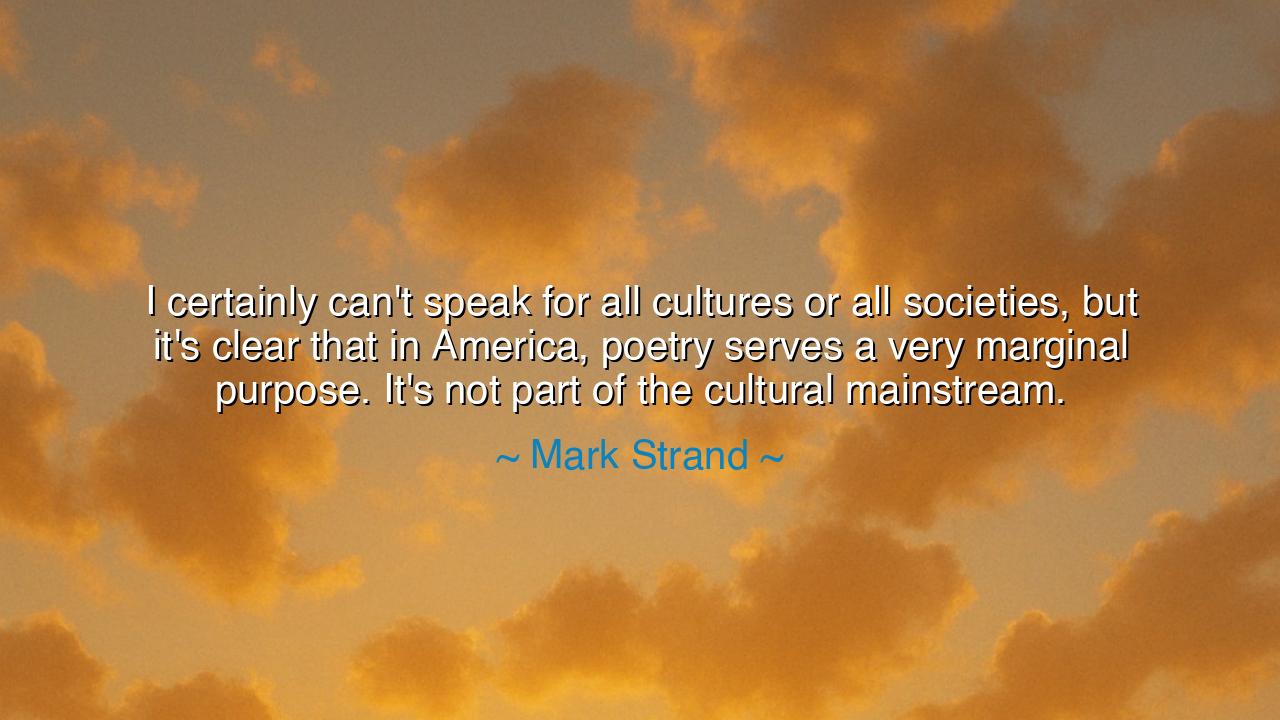
I certainly can't speak for all cultures or all societies, but
I certainly can't speak for all cultures or all societies, but it's clear that in America, poetry serves a very marginal purpose. It's not part of the cultural mainstream.






"I certainly can't speak for all cultures or all societies, but it's clear that in America, poetry serves a very marginal purpose. It's not part of the cultural mainstream." — thus declared Mark Strand, poet of shadows and silences, who looked upon the state of his art in his own land with both clarity and sorrow. These words strike not as complaint but as lament, for he speaks of a treasure buried, a flame neglected, a voice that should echo through the streets yet is confined to the corners of classrooms and the solitude of a few readers. Strand, who won the Pulitzer Prize for his verse, knew well the power of poetry to shape the human spirit, and thus felt deeply the loss when a society turns its face from that power.
To understand his saying, we must first remember the origin of poetry among the ancients. In the days of Homer, the bard was not marginal but central. His song was the memory of the people, their history, their faith, their wisdom. In the courts of kings, in the gatherings of warriors, in the hearths of families, poetry was the vessel of truth and glory. Likewise, in India, the Vedas were sung as sacred poetry, forming the very foundation of culture. Poetry was not pastime, but lifeblood; not ornament, but oracle. That Strand should speak of its marginal place in America is to reveal the tragic distance between what once was and what now is.
Consider a story from American history itself. During the Civil War, the words of Walt Whitman and the verses of Emily Dickinson carried a resonance far beyond the page. Whitman walked among the wounded, his lines capturing both the agony and nobility of the human condition. His Leaves of Grass was not marginal—it was the heartbeat of a nation in conflict. Yet in our modern age, Strand observes, such voices are drowned by the noise of commerce, entertainment, and the pursuit of distraction. The people no longer look to the poet for guidance, and the poet is exiled to the margins of cultural life.
This truth is not confined to America alone, though Strand spoke particularly of it. Across much of the modern world, poetry has been dethroned from the central place it held for millennia. Where once societies turned to poets for remembrance and prophecy, now they turn to screens, to fleeting spectacles, to shallow amusements. The poet’s voice, though still alive, is heard only by the few who seek it. Strand’s words call us to mourn this decline, but also to recognize it as a challenge: the task of restoring poetry to its rightful place.
Yet his lament is not a final death-knell but a summons. For though poetry may be marginal, it is not extinguished. A flame on the margin still gives light; a whisper at the edge of the crowd can still carry truth. And history shows that when poetry seems most forgotten, it often rises with greatest force. In times of upheaval, revolution, and suffering, people turn again to words that cut deeper than slogans, to songs that endure when speeches are forgotten. Thus, poetry waits, patient, for its moment of return to the center.
What, then, is the lesson for us? It is this: do not neglect poetry. Even if society places it on the margin, you need not. Seek it, read it, carry it in your heart. For poetry sharpens perception, deepens compassion, and awakens the soul. Where the culture offers noise, poetry offers silence full of meaning. Where the culture forgets, poetry remembers. Where the culture distracts, poetry restores. To engage with poetry is to reclaim a part of humanity that modern life would bury.
Practical action lies before us. Read aloud a poem each day, and let it shape your breath. Share poems with your children, your friends, your community, for in sharing, you resist the marginalization Strand describes. Support living poets, for they are the hidden prophets of our age. And if you can, write your own lines—not to be famous, but to keep alive within yourself the power of words to bear grief, joy, and truth.
Thus, Strand’s words, though mournful, are also a call: though poetry may be marginalized by society, it need not be marginalized by you. Let it return to the center of your own life, and in doing so, you begin the work of restoring it to the life of your people. For poetry, though forgotten by many, is still the soul’s oldest language, waiting to be remembered.






AAdministratorAdministrator
Welcome, honored guests. Please leave a comment, we will respond soon